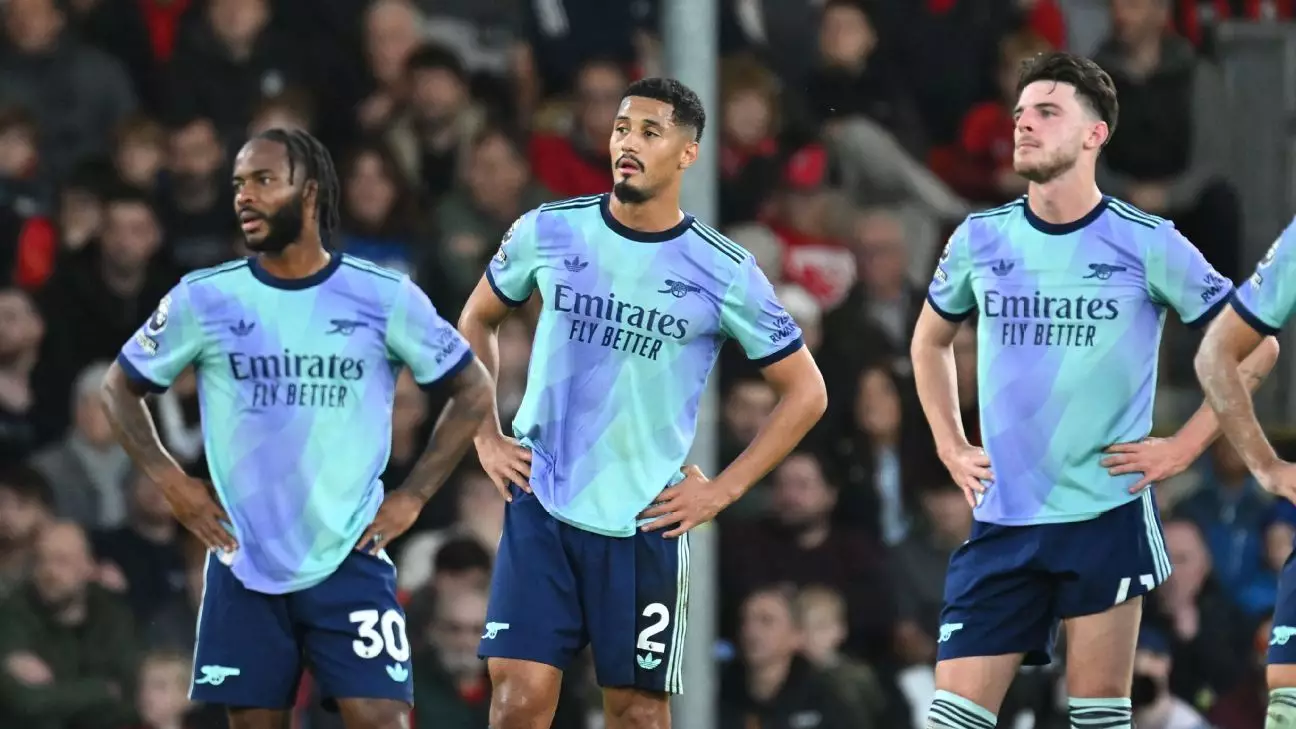In a rather shocking development during the early stages of the Premier League season, Arsenal faced their first loss of the campaign, succumbing to Bournemouth with a 2-0 scoreline at the Vitality Stadium. The defeat not only exposed vulnerabilities in Arsenal’s gameplay but also highlighted key areas that Mikel Arteta and his squad need to address as the season progresses.
Arsenal initially exhibited control in the first half, demonstrating their ability to dictate the pace of the match. However, a moment of folly from Leandro Trossard changed the dynamics entirely. His careless pass to William Saliba led to a catastrophic sequence of events, culminating in Saliba’s red card—an incident that VAR deemed a denial of a clear goal-scoring opportunity for Bournemouth’s Evanilson. This moment marked a dramatic turning point in the game, as it not only handed Bournemouth a numerical advantage but also instilled confidence in the home side.
Despite the setback, David Raya’s commendable goalkeeping managed to keep the score level until the end of the first half. His interventions, though shaky at times, were critical in what felt like a burgeoning crisis for the Gunners. However, it seemed inevitable that the pressure would mount, and shortly after the break, Bournemouth took the lead from a well-executed corner, deftly finished by Ryan Christie.
Arsenal’s performance could be summarized by their missed opportunities, particularly a key chance orchestrated by Mikel Merino. The Spain international intercepted a poor pass from Bournemouth’s Kepa Arrizabalaga and set up Gabriel Martinelli for a potentially game-changing goal. Unfortunately, the attempt went straight into the arms of the goalkeeper—an inefficiency that epitomized Arsenal’s troubles on the day.
Not long after that costly miss, an under-hit pass by Jakub Kiwior resulted in a penalty against Arsenal, and Justin Kluivert effectively doubled Bournemouth’s lead. This sequence of events highlighted not just individual errors but also an alarming lapse in the collective defensive organization of the team. With Saliba now suspended for the upcoming match against Liverpool, the enormity of this defeat becomes even clearer.
While the overall team performance was disappointing, several individual displays stood out, for better or worse. Mikel Merino, despite being pulled off after Saliba’s ejection, showcased a composure in possession and an ability to create chances—a bright spot in an otherwise dismal evening for Arsenal. Declan Rice also emerged as a key player in the midfield, providing a robust defensive presence amidst the chaos.
Conversely, the performances of Trossard and Raya were marked by significant errors. Trossard’s misplaced pass that led to the red card proved crucial, and he struggled to find rhythm throughout the match. Meanwhile, Raya’s inconsistencies—particularly when collecting crosses—added to the mounting pressure on the Arsenal defense.
Arsenal’s attacking prowess was noticeably hampered by the absences of key figures like Martin Ødegaard and Bukayo Saka. The team seemed to lack the dynamism and creativity typically provided by those players, resulting in a flat attacking display. This void not only limited their offensive potential but also placed immense pressure on the players who were available to perform.
The tactical shifts made by Arteta—including the introduction of Gabriel Martinelli—were aimed at generating some spark in a seemingly stagnant side. However, the lack of service and effective ball movement stymied any potential late comeback.
The loss against Bournemouth serves as an unflattering mirror reflecting Arsenal’s current shortcomings. Individual errors, missed opportunities, and a lack of depth without key players all contributed to this disappointing result. As they prepare to face Liverpool next, Mikel Arteta must reconcile these issues quickly if he wishes to prevent this loss from snowballing into a more problematic stretch of the season.
In this crucial juncture of their campaign, Arsenal will need to rally together, limiting individual mistakes, and rediscovering the cohesion and flair that earned them impressive victories earlier in the season. The path forward demands resilience, creativity, and a return to form—qualities that, if embraced, will ensure Arsenal remains competitive in the upcoming fixtures.

